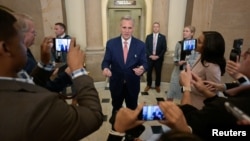A U.S. government shutdown is looking inevitable for Sunday as the Senate and House of Representatives remain at odds over the size of its budget for the next 12 months, continued aid for Ukraine to fight Russia, immigration controls at the U.S.-Mexican border and social welfare programs to help impoverished Americans.
The Democratic-controlled Senate is working on a seven-week funding plan that would keep the government fully open through mid-November to give lawmakers more time to set spending levels through September 2024.
However, House Speaker Kevin McCarthy, with a narrow Republican majority in his chamber, has already rejected putting the Senate plan to a House vote.
Instead, the House voted late Thursday on amendments to yearlong appropriations bills for four government agencies. The bills have little chance of Senate approval and, in any event, would not prevent a Saturday midnight shutdown of nonessential government operations.
Government agencies on Thursday morning began notifying their workers that a shutdown could be in the offing.
Senate Republican leader Mitch McConnell warned lawmakers about the dire effects of shutting down part of the government, especially difficulties in controlling the influx of migrants at the country’s southern border with Mexico.
“Shutting down the government is not like pressing pause,” McConnell said. “It’s not an interlude that lets us pick up where we left off. It’s an actively harmful proposition. And instead of producing any meaningful policy outcomes, it would actually take the important progress being made on a number of key issues and drag it backward.”
If a short-term funding deal cannot be reached, more than 4 million U.S. military service personnel and government workers would not be paid, although essential services, such as air traffic control outlets and official border entry points would still be staffed. Pensioners might not get their monthly government payments on time to pay bills and buy groceries, and national parks could be closed.
Such shutdowns have occurred four times in the last decade in the U.S., but often have lasted just a day or two until lawmakers reach a compromise to fully restart government operations. But one shutdown that occurred during the administration of former President Donald Trump lasted 35 days as he unsuccessfully sought funding to build a wall along the U.S.-Mexican border.
As thousands of migrants are again walking daily across the southwestern U.S. border, immigration controls remain as one of the sticking points in setting the U.S. government spending levels and policies for the fiscal year that begins Sunday.
McCarthy reached a deal in May with President Joe Biden, a Democrat, on spending levels for fiscal 2024, but a small faction of far-right House Republicans rejected the deal and now is demanding further spending cuts.
The McCarthy-Biden deal called for $1.59 trillion in discretionary spending in fiscal 2024, but some of the right-wing members of the House Freedom Caucus are demanding another $120 billion in cuts and further border controls. The cuts would be a relatively small portion of the overall $6.4 trillion U.S. budget and would not affect pension payments or government-provided health insurance for older Americans.
Some of the most conservative lawmakers also want to sharply pare or end U.S. aid to Ukraine, even as more mainstream Republican lawmakers still staunchly support the Ukraine fight against Russia’s invasion as essential to U.S. national security and protection of NATO countries in Europe.
The Senate’s short-term spending plan through mid-November could possibly win passage in the House, but only with a mix of Republican and Democratic votes.
In politically contentious Washington, the hardline Republican lawmakers intent on cutting spending have threatened to try to oust McCarthy from his speakership if he tries to pass a spending bill with any Democratic votes.
The Washington Post reported Thursday that, according to anonymous sources, a group of far-right House Republicans is scheming to remove McCarthy as House speaker as soon as next week and replacing him with one of his allies, Rep. Tom Emmer of Minnesota.
The Post said it is not clear whether the group will actually go forward with their plan or if the politicians will instead just use their plan to express their displeasure with McCarthy. Either way, such a move would undoubtedly add even more confusion to the talks on Capitol Hill amid the possibility of a government shutdown.
Biden told a group of donors at a fundraiser in San Francisco on Wednesday, “I think that the speaker is making a choice between [retaining] the speakership and American interests."
McCarthy suggested Tuesday that a shutdown could be avoided if Biden would negotiate on border issues.
"Call us up, let's sit down and get this done before the end of the day," McCarthy said. But Trump, the leading 2024 Republican presidential candidate to run against Biden as he seeks reelection, has taken to social media to push his congressional allies toward a shutdown.





Forum